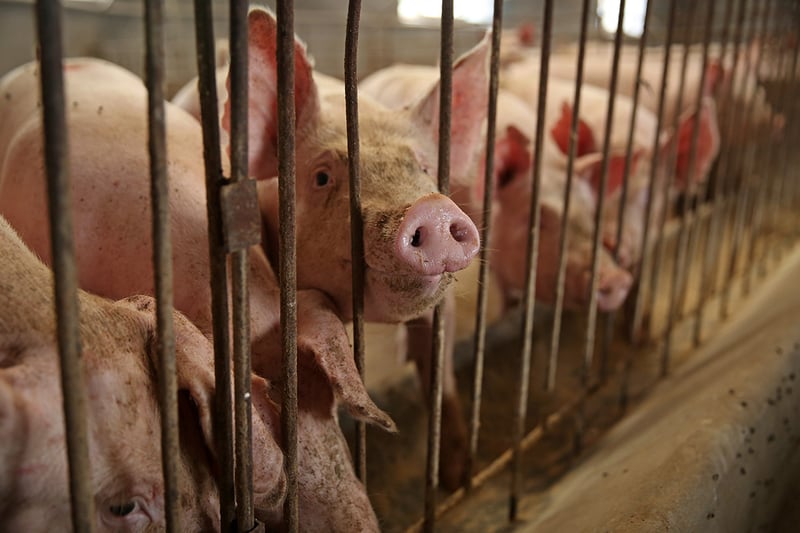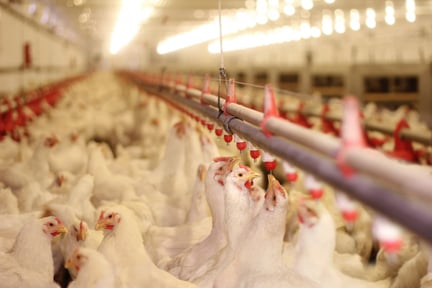
World Animal Protection to urge world leaders to confront the true cost of factory farming
Press release
Baku, Azerbaijan — World Animal Protection, a leading global charity focused on the impact of factory farming on human health, the environment and on farmed and wild animals, will be on the ground at COP29 for on-the-record quotes and backgrounders for journalists covering the conference.
The charity’s delegation will be available for interviews and analysis about how governments can and must address the urgent need for a just transition to sustainable, humane food systems and fairer climate financing.
World Animal Protection’s Expert Panel Available for Media at COP29 includes:
- Tricia Croasdell – CEO
- Kelly Dent – Director of External Engagement & Media
- Angel Flores – External Affairs Manager
Access Key Resources:
Journalists can download the report, Towards Equitable, Humane, and Sustainable Food Systems, which outlines why phasing out factory farming is essential for tackling climate change, safeguarding animal welfare, protecting public health, and ensuring global food security. The report presents a visionary roadmap for a fairer, humane, and more sustainable food system.
World Animal Protection Event Highlights at COP29:
Join us at these special events where media are invited to gain deeper insights into critical issues surrounding agriculture, food systems, biodiversity, and climate change:
-
Towards Equitable, Humane and Sustainable Food Systems
- Date: Tuesday, 12 November
- Time: 12.00-12.45
- Venue: Action on Food Hub Pavilion
- Featuring: Tricia Croasdell, Global Chief Executive
-
Roundtable: Phasing Out of Industrial Animal Agriculture as a Pathway to 1.5C and Food Justice
- Date: Saturday, 16 November
- Time: 10:00 – 11:30
- Location: Action on Food Hub Pavilion
- Collaborators: ActionAid, Global Forest Coalition, Climate Watch Thailand, Youth in Agroecology and Restoration Network
-
Side Event: Unlocking the Power of Marginalized Communities in Global Food Systems Transformation
- Date: Saturday, 16 November
- Time: 17:30 – 18:30
- Location: Action on Food Hub Pavilion
- Partners: Alliance for Food Sovereignty in Africa
-
Side Event: Protecting Animals to Combat Climate and Biodiversity Crises
- Date: Saturday, 16 November
- Time: 12:15 – 13:00
- Location: SDG Pavilion
-
Reception: Just Transition Day
- Date: Saturday, 16 November
- Time: 18:30 – 20:00
- Location: Action on Food Hub Pavilion
- Partners: Changing Markets Foundation, Compassion in World Farming, Four Paws, World Animal Protection, Mercy for Animals, ProVeg
-
Official Side Event: From Field to Plate - Aligning Food Systems with Climate and Biodiversity Goals
- Date: Monday, 18 November
- Time: 18:30 – 20:00
- Location: Side Event 6
- Partners: ProVeg, Compassion in World Farming, Brighter Green, Consumers International
Statements from World Animal Protection Leaders:
Tricia Croasdell, CEO of World Animal Protection, emphasized the urgent need for delegates to understand the connection between animal welfare and climate change. She said:
Enough now. Years of inaction are risking all of our futures. It is clear that if world leaders want to make fundamental change at this COP, they will recognize that the treatment of animals, particularly in our food system, is central to our own species’ survival.
"The simple truth is that we cannot tackle climate change or protect human rights without addressing industrial factory farming — a significant contributor to greenhouse gas emissions. The consequences of ongoing inaction are dire. Without substantial reductions in food system emissions, it will be impossible to prevent global heating from spiraling further out of control.
Kelly Dent, Director of External Engagement, highlighted the role of governments at COP29:
Governments gathering for COP29 must lead the charge by incorporating sustainable agriculture into their climate strategies, capping the growth of industrial animal agriculture, and promoting agroecological practices.
"The window for action is closing. Every year of delay pushes us closer to environmental disaster. The time for transformative change to an equitable, humane, and sustainable food system is now—before it’s too late.
NOTES TO EDITORS:
For more information about World Animal Protection at COP29 and to arrange interviews with our experts on the ground in Baku, please contact Global Media Manager, Peter Simpson petersimpson@worldanimalprotection.org Tel: +44 (0) 7803 051 848.
- According to the UN's Food and Agriculture Organisation (FAO), livestock production accounts for approximately 14.5% of global greenhouse gas emissions, rivalling the emissions from the entire transport sector.
- The industry is a major source of methane - a greenhouse gas that is 25 times more potent than carbon dioxide over a 100-year period. The methane is largely produced by ruminant animals such as cows during digestion and from manure management systems in factory farms.
- In addition to methane emissions, the production of animal feed, deforestation for grazing land, and the use of fertilisers, release substantial amounts of carbon dioxide and nitrous oxide into the atmosphere.
- Vast swaths of the Amazon rainforest are being cleared to grow soy, with over 75% of this crop used as animal feed. This deforestation not only releases carbon stored in trees but also diminishes the Earth's capacity to absorb future emissions, exacerbating climate change.
- Left uncheck in its global expansion, the cost of factory farming on people, animals and the environment will be huge - especially to small holders in developing regions like Africa.
- Deforestation, water pollution, and habitat destruction driven by animal agriculture undermine food security.
- These inequities in our food system mean that the world's poorest and most vulnerable populations that rely on subsistence farming bear the brunt of climate change's consequences, even though they contribute the least to the problem.
About World Animal Protection
World Animal Protection is the global voice for animal welfare, with more than 70 years'; experience campaigning for a world where animals live free from cruelty and suffering. Our work to protect animals will play a vital role in solving the climate emergency, the public health crisis, and the devastation of natural habitats.
We have offices in 12 countries and work across 47 countries. We collaborate with local communities, the private sector, civil society, and governments to change animals' lives for the better. Our goal is to change the way the world works to end animal cruelty and suffering for both wild and farmed animals. Through our global food system strategy, we will end factory farming and create a humane and sustainable food system that puts animals first. By transforming the broken systems that fuel exploitation and commodification, we will give wild animals the right to a wildlife.
Together, we will change the way the world works and end animal cruelty and suffering. Forever.
Visit World Animal Protection International
Bios:
Tricia Croasdell, CEO
Tricia's journey to the helm of World Animal Protection is marked by a steadfast commitment to animal advocacy. Before being appointed CEO earlier this year, she was the charity's UK Country Director who invigorated fundraising efforts lead successful campaigns to drive positive outcomes for animals worldwide.
Tricia held pivotal roles with global organisations including WWF, where she orchestrated global initiatives for institutional funding. Her career also includes stints at 10 Downing Street and as Director of Communications for HM The Queen's Commonwealth Summit, where she honed her skills in driving impactful policy and communication strategies on a global scale.
Kelly Dent, Global Director of External Engagement:
Kelly has 30 years' experience lobbying and campaigning on climate change, poverty, corporate accountability, trade, labour, gender, and human rights around the world. She now focuses on animal welfare. She is the strategic lead of World Animal Protection's advocacy campaign to persuade G20 governments to agree a global ban on the trade in wildlife for commercial purposes.
Areas of expertise:
- Animal welfare law, including the Animal Protection Index
- Wildlife trade
- Influencing and working with Governments, multilateral institutions, UN bodies and mechanisms
- Climate change
- Company policy
- G20 world leader
Angel Flores, International External Affairs Manager
With a rich background in international development, Angel has held pivotal roles at organisations such as the UN World Food Programme and the British Council, where she led cross-functional, multicultural teams in policy advocacy, programme management, and external relations. Living in the Philippines -a country highly susceptible to climate disasters - Angel is passionate about championing a world where animals, communities and their ecosystems are respected and protected. She believes these values are essential to achieving sustainable development that genuinely benefits all living beings.
Areas of expertise:
- Climate Change
- Influencing and working with Governments, multilateral institutions, UN bodies and mechanisms, development banks
- Environmental sustainability Animal protection
- Social entrepreneurship
- Agriculture, and resilience-building, particularly within conflict-affected and climate-vulnerable regions.
